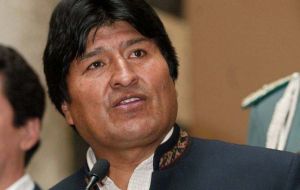MercoPress. South Atlantic News Agency
Full support for Bolivia's Morales from regional leaders
 President Evo Morales
President Evo Morales Bolivian President Evo Morales after having secured support from South American neighbors tried on Friday to halt a wave of political violence that has killed at least 12 people by arranging talks with one of four rebel governors who fiercely oppose his reforms.
Two weeks of anti Morales protests in four of the country's nine provinces escalated to open rioting and killings with roads blocks in much of eastern Bolivia, causing fuel and food shortages in the opposition-controlled city of Santa Cruz. The governor of natural gas-rich Tarija province Mario Cossio, said he would meet with President Morales late on Friday in La Paz, adding he would represent three other rebel governors who have so far rejected talks. The governors are demanding autonomy for their regions and blame Morales for the recent violence and sabotage to pipelines that caused chaos in the natural gas industry, Bolivia's biggest source of income. "We're open to dialogue not only with the governors, but also with the participation of mayors and different social sectors" said Morales who has angered opponents with plans to introduce amendments to the constitution including less gas and oil royalties for producing provinces and breaking up ranches to distribute land among the poor Indians and peasants, his main political support. The constitutional reforms are scheduled to be votes in a referendum next December. President Morales, who survived a recall election in August with 67% of the vote, said it would be difficult to reach an agreement. Morales, Bolivia's first indigenous president repeated accusations that the opposition was following orders from US Ambassador Philip Goldberg, whom he threw out of the country this week. Washington retaliated by expelling Bolivia's ambassador and the State Department said on Friday that Morales' actions were a sign of "weakness and desperation." Morales who is a former coca farmer has pledged to transform Bolivia, but some of his reforms have stalled due to fierce opposition from the wealthier eastern part of the country, run by European descent elites who own most of the country's farmland. Leaders of Brazil, Argentina, Uruguay, Ecuador, Peru and other countries expressed support for Morales. Honduras told a U.S. envoy not to present his credentials as ambassador in a diplomatic snub in support of Bolivia. The Organization of American States condemned the pro-autonomy violence and rioting and praised President Morales for his "prudence and patience". Venezuela's Hugo Chavez said he would go to any lengths to defend Morales, implying military action but Bolivia's military said it would not allow any intervention. "To the president of Venezuela, Mr. Hugo Chavez, and to the international community, we say that the armed forces (of Bolivia) emphatically reject any foreign intervention of any kind, wherever they be from" Armed Forces Commander in Chief Luis Trigo said in a televised statement. Argentina, Brazil and Colombia, Friends of Bolivia Group, said they would not tolerate any attempts to overthrow Morales and offered to broker talks, but President Morales declined their help for the time being. The government has sent troops to protect natural gas facilities, but police and soldiers have largely stayed off the streets in Santa Cruz because protesters had targeted them. Sabotage to valves and pipelines forced Bolivia to temporarily shut off natural gas exports to Brazil on Thursday, and exports to Argentina were still cut on Friday.




Top Comments
Disclaimer & comment rulesCommenting for this story is now closed.
If you have a Facebook account, become a fan and comment on our Facebook Page!